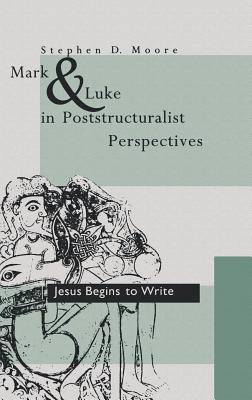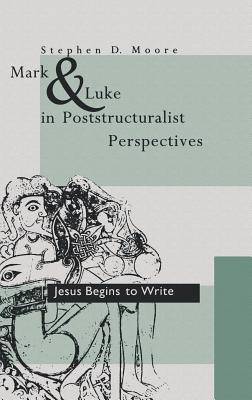
- Retrait gratuit dans votre magasin Club
- 7.000.000 titres dans notre catalogue
- Payer en toute sécurité
- Toujours un magasin près de chez vous
- Retrait gratuit dans votre magasin Club
- 7.000.0000 titres dans notre catalogue
- Payer en toute sécurité
- Toujours un magasin près de chez vous
Mark and Luke in Poststructuralist Perspectives
Jesus Begins to Write
Stephen D Moore
Livre relié | Anglais
106,95 €
+ 213 points
Description
"What is the lesson of that other, newly sprung tree (the cross) in whose bark Mark has carved his Gospel (for this is a book that bleeds)? Is it that Jesus's body, grafted onto the cross, became one with it, and thus became tree, branch, book, and leaf, inscribed with letters of blood, can now at last be read, no longer an indecipherable code but an open codex? And that in its (now) re(a)d(able) ink, lately invisible, the message that was scratched into the fig tree is transcribed: outside the gates, but only just, the summer Son is shining in full strength?"--Stephen D. Moore
In this book Stephen D. Moore offers a dazzling new reading of the Gospels of Mark and Luke, applying the poststructuralist techniques of Derrida, Lacan, and Foucault to illuminate these texts in a way that no one has done before. Written with wit and a sensitivity to words--and wordplay--that is reminiscent of Moore's fellow countryman James Joyce, the book is also deeply learned, impressive in its detailed knowledge of previous scholarship as well as in the challenges it presents to that scholarship.
Moore argues that whereas the language of the Gospels is concrete, pictorial, and often startling, the language of modern gospel scholarship tends to be propositional and abstract. Calling himself a New Test-what-is-meant scholar, he approaches the Gospels of Mark and Luke as though they were pictograms or dreamwork to decipher and interpret, writing a response that is no less visceral and immediate than the biblical texts themselves.
In this book Stephen D. Moore offers a dazzling new reading of the Gospels of Mark and Luke, applying the poststructuralist techniques of Derrida, Lacan, and Foucault to illuminate these texts in a way that no one has done before. Written with wit and a sensitivity to words--and wordplay--that is reminiscent of Moore's fellow countryman James Joyce, the book is also deeply learned, impressive in its detailed knowledge of previous scholarship as well as in the challenges it presents to that scholarship.
Moore argues that whereas the language of the Gospels is concrete, pictorial, and often startling, the language of modern gospel scholarship tends to be propositional and abstract. Calling himself a New Test-what-is-meant scholar, he approaches the Gospels of Mark and Luke as though they were pictograms or dreamwork to decipher and interpret, writing a response that is no less visceral and immediate than the biblical texts themselves.
Spécifications
Parties prenantes
- Auteur(s) :
- Editeur:
Contenu
- Nombre de pages :
- 192
- Langue:
- Anglais
Caractéristiques
- EAN:
- 9780300051971
- Date de parution :
- 25-03-92
- Format:
- Livre relié
- Format numérique:
- Genaaid
- Dimensions :
- 163 mm x 243 mm
- Poids :
- 498 g

Les avis
Nous publions uniquement les avis qui respectent les conditions requises. Consultez nos conditions pour les avis.






